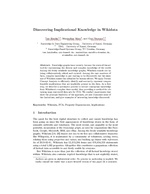Discovering Implicational Knowledge in Wikidata
From International Center for Computational Logic
Discovering Implicational Knowledge in Wikidata
Tom HanikaTom Hanika, Maximilian MarxMaximilian Marx, Gerd StummeGerd Stumme
Tom Hanika, Maximilian Marx, Gerd Stumme
Discovering Implicational Knowledge in Wikidata
In Diana Cristea, Florence Le Ber, Baris Sertkaya, eds., Proceedings of the 15th International Conference on Formal Concept Analysis (ICFCA'19), volume 11511 of LNCS, 315--323, June 2019. Springer
Discovering Implicational Knowledge in Wikidata
In Diana Cristea, Florence Le Ber, Baris Sertkaya, eds., Proceedings of the 15th International Conference on Formal Concept Analysis (ICFCA'19), volume 11511 of LNCS, 315--323, June 2019. Springer
- KurzfassungAbstract
Knowledge graphs have recently become the state-of-the-art tool for representing the diverse and complex knowledge of the world. Among the freely available knowledge graphs, Wikidata stands out by being collaboratively edited and curated. Among the vast numbers of facts, complex knowledge is just waiting to be discovered, but the sheer size of Wikidata makes this infeasible for human editors. We apply Formal Concept Analysis to efficiently identify and succinctly represent comprehensible implications that are implicitly present in the data. As a first step, we describe a systematic process to extract conceptual knowledge from Wikidata’s complex data model, thus providing a method for obtaining large real-world data sets for FCA. We conduct experiments that show the principal feasibility of the approach, yet also illuminate some of the limitations, and give examples of interesting knowledge discovered. - Projekt:Project: DIAMOND, HAEC, Wikidata
- Forschungsgruppe:Research Group: Wissensbasierte SystemeKnowledge-Based Systems
@inproceedings{HMS2019,
author = {Tom Hanika and Maximilian Marx and Gerd Stumme},
title = {Discovering Implicational Knowledge in Wikidata},
editor = {Diana Cristea and Florence Le Ber and Baris Sertkaya},
booktitle = {Proceedings of the 15th International Conference on Formal
Concept Analysis (ICFCA'19)},
series = {LNCS},
volume = {11511},
publisher = {Springer},
year = {2019},
month = {June},
pages = {315--323},
doi = {10.1007/978-3-030-21462-3_21}
}

